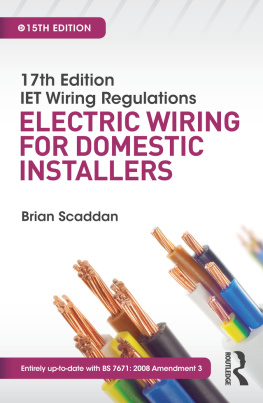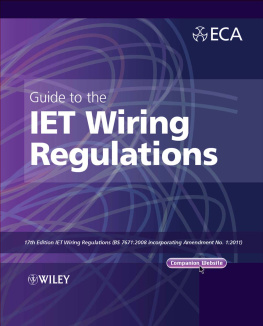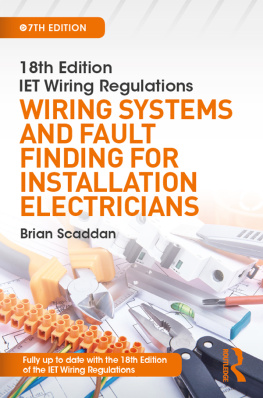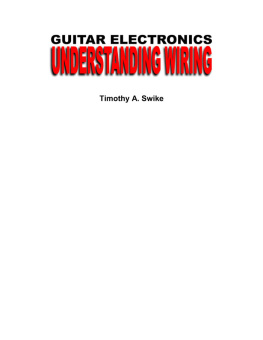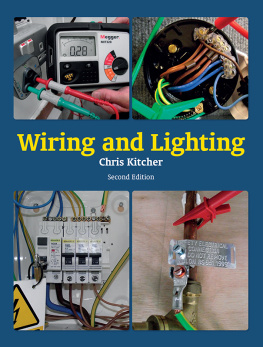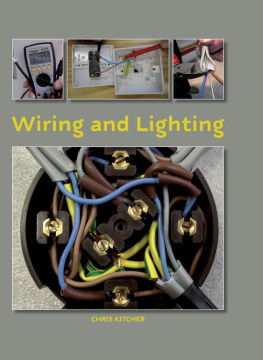Scaddan - 17th edition IET wiring regulations : electric wiring for domestic installers
Here you can read online Scaddan - 17th edition IET wiring regulations : electric wiring for domestic installers full text of the book (entire story) in english for free. Download pdf and epub, get meaning, cover and reviews about this ebook. City: London, year: 2012, publisher: Routledge, genre: Children. Description of the work, (preface) as well as reviews are available. Best literature library LitArk.com created for fans of good reading and offers a wide selection of genres:
Romance novel
Science fiction
Adventure
Detective
Science
History
Home and family
Prose
Art
Politics
Computer
Non-fiction
Religion
Business
Children
Humor
Choose a favorite category and find really read worthwhile books. Enjoy immersion in the world of imagination, feel the emotions of the characters or learn something new for yourself, make an fascinating discovery.
17th edition IET wiring regulations : electric wiring for domestic installers: summary, description and annotation
We offer to read an annotation, description, summary or preface (depends on what the author of the book "17th edition IET wiring regulations : electric wiring for domestic installers" wrote himself). If you haven't found the necessary information about the book — write in the comments, we will try to find it.
Scaddan: author's other books
Who wrote 17th edition IET wiring regulations : electric wiring for domestic installers? Find out the surname, the name of the author of the book and a list of all author's works by series.
17th edition IET wiring regulations : electric wiring for domestic installers — read online for free the complete book (whole text) full work
Below is the text of the book, divided by pages. System saving the place of the last page read, allows you to conveniently read the book "17th edition IET wiring regulations : electric wiring for domestic installers" online for free, without having to search again every time where you left off. Put a bookmark, and you can go to the page where you finished reading at any time.
Font size:
Interval:
Bookmark:

Electric Wiring for Domestic Installers
- The how-to guide for home wiring to professional standards
- Essential reading for serious DIY, electrical installation, plumbing, heating systems, TV and security alarm installation
- Up-to-date with the latest IET Wiring Regulations
This book has for many years been the standard guide to the practical aspects of domestic electrical wiring. It explains how to carry out work safely and correctly in a step-by-step manner.
Essential reading for anyone obtaining a Domestic Installer Scheme Qualification which relates to Part P of the Building Regulations, this title also acts as a handy pocket guide to best practice for electricians. Although not intended as a DIY manual, non-qualified persons will also find this book useful reading.
Brian Scaddan , I Eng, MIET, is a consultant for and an Honorary Member of City & Guilds with over 40 years experience in Further Education and training. He is Director of Brian Scaddan Associates Ltd, an approved City & Guilds training centre offering courses on all aspects of electrical installation contracting including the C&G 2382-15, 2392-10, 2377-22, 2394-01, 2395-01 and 2396-01. He is also a leading author of books for these courses.
Electric Wiring for Domestic Installers
Fifteenth Edition
Brian Scaddan

Fifteenth edition published 2015
by Routledge
2 Park Square, Milton Park, Abingdon, Oxon OX14 4RN
and by Routledge
711 Third Avenue, New York, NY 10017
Routledge is an imprint of the Taylor & Francis Group, an informa business
2015 Brian Scaddan
The right of Brian Scaddan to be identified as author of this work has been asserted by him in accordance with sections 77 and 78 of the Copyright, Designs and Patents Act 1988.
All rights reserved. No part of this book may be reprinted or reproduced or utilised in any form or by any electronic, mechanical, or other means, now known or hereafter invented, including photocopying and recording, or in any information storage or retrieval system, without permission in writing from the publishers.
Trademark notice : Product or corporate names may be trademarks or registered trademarks, and are used only for identification and explanation without intent to infringe.
First edition published 1940 by Newnes, an imprint of Elsevier
Fourteenth edition published 2012 by Routledge
British Library Cataloguing in Publication Data
A catalogue record for this book is available from the British Library
Library of Congress Cataloging-in-Publication Data
A catalog record for this book has been requested
ISBN: 978-1-138-84890-0 (pbk)
ISBN: 978-1-315-72590-1 (ebk)
Typeset in Kuenstler 480 and Trade Gothic by
Servis Filmsetting Ltd, Stockport, Cheshire
This book is a guide to the practical aspects of domestic electric wiring. It seeks to address the areas of most concern to the qualified electrician, especially design and testing. It will also be a useful addition to the resources available for students working towards NVQs or City & Guilds qualifications.
It is also a vital reference source for many other professionals and operatives whose work demands a knowledge of electrical installations, including electrical engineers, heating engineers, architects and maintenance staff. The contents will be of value to those intending to gain a Domestic Installer Scheme Qualification which relates to Part P of the Building Regulations. It is not intended as a DIY manual, although some nonqualified persons may find certain topics useful before calling in qualified operatives.
The contents of this new edition cover current professional best practice and are fully compliant with the 17th Edition IET Wiring Regulations.
Brian Scaddan
The UK Generation, Transmission and Distribution System
Important terms/topics covered in this chapter:
- Voltage bands
- The Electricity Safety Quality and Continuity Regulations (ESQCR)
- BS 7671: 2008 The Wiring Regulations
- The Electricity at Work Regulations (EAWR)
- The Building Regulations
- TT, TN-S and TN-C-S earthing systems
By the end of this chapter the reader should:
- know the regulations and recommendations relating to electrical installations,
- be aware of the Building Regulations relevant to electrical installations in dwellings,
- be aware of the notifiable work under Part P of the Building Regulations,
- understand the arrangements of the UK earthing systems.
In the early days of electricity supply, each town or city in the United Kingdom had its own power station which supplied the needs of its particular area.
Standardization was not evident and many different voltages and frequencies were used throughout the country. By the time of the First World War (19141918), there were some 600 independent power stations in use. However, the heavy demands made by the war industry showed the inadequacies of the system and several select committees were set up to investigate possible changes. Little was achieved until 1926, when it was suggested that 126 of the largest and most efficient power stations should be selected and connected by a grid of high-voltage transmission lines covering the whole country, and, at the same time, the frequency standardized at 50 Hz. The remaining power stations would be closed down and local supply authorities would obtain their electricity in bulk from the grid, via suitable substations. The system voltage was 132 000 V (132 kV) and the supply frequency 50 Hz.
On 1 April 1948, the whole of the electricity supply industry was nationalized and, in 1957, the Central Authority responsible for the generation of electricity was renamed the Central Electricity Generating Board (CEGB).
Since then, of course, the electricity industry has become privatized and the CEGB has been replaced by the National Grid Company, which buys, at the lowest price, generated electricity from such companies as National Power, PowerGen, Nuclear Electric, French Electrique and Scottish Hydro Electric.
Electricity boards have become Distribution Network Operators (DNOs) and they, in turn, buy electrical energy from the National Grid Company to distribute to their own consumers.
The broad structure of the industry is shown in .
The very nature of the grid system is such that power has to be transmitted over large distances. This immediately creates a problem of voltage drop. To overcome this problem, a high voltage is used for transmission (400 or 132 kV), the 400 kV system being known as the Super Grid. We cannot, however, generate at such high voltages (the maximum in modern generators is 25 kV) and transformers are used to step up the generated voltage to the transmission voltage. At the end of a transmission line is a grid substation, where the requirements of the grid system in that area can be controlled and where the transmission voltage is stepped down via a transformer to 132 kV.
It is at this stage that the different DNOs distribute the power required by their consumers around that particular area. The system voltage is then further reduced at substations to 33 000, 11 000 and 415/240 V ().

Font size:
Interval:
Bookmark:
Similar books «17th edition IET wiring regulations : electric wiring for domestic installers»
Look at similar books to 17th edition IET wiring regulations : electric wiring for domestic installers. We have selected literature similar in name and meaning in the hope of providing readers with more options to find new, interesting, not yet read works.
Discussion, reviews of the book 17th edition IET wiring regulations : electric wiring for domestic installers and just readers' own opinions. Leave your comments, write what you think about the work, its meaning or the main characters. Specify what exactly you liked and what you didn't like, and why you think so.

